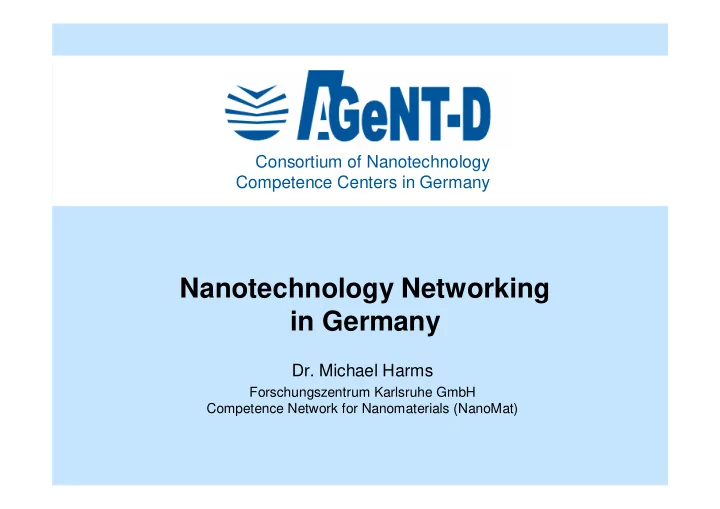

Consortium of Nanotechnology Competence Centers in Germany Nanotechnology Networking in Germany Dr. Michael Harms Forschungszentrum Karlsruhe GmbH Competence Network for Nanomaterials (NanoMat)
Consortium of Nanotechnology Competence Centers in Germany Outline • Nanotechnology Competence Centers (CCNanos) in Germany - History and Status • Consortium of the Nanotechnology Competence Centers in Germany (AGeNT-D) - Structure and Management - Topics and Goals - Outlook • AGeNT-D at the nano tech 2008
Consortium of Nanotechnology Competence Centers in Germany History of the Competence Centers in Germany • The situation 10 years ago: Strong specialization of location and personnel (industry, research) � Networks of partners from business, science, politics and an infrastructure which promotes competence were required for innovation. • Call of the German Ministry of Education and Research (BMBF) to establish CCNanos in 1998 • At the beginning 6 nationwide CCNanos, each with a strong thematic focus • Members: research institutions, universities, industries, others • Over the last years with increasing relevance of nanotechnology - New CCNanos because of re-organization - New funding models with concentration on regional subjects - Development of similar organization platforms - Cross-linking of CCNanos � New kind of organizational structure was needed: AGeNT-D
Consortium of Nanotechnology Competence Centers in Germany Map of AGeNT-D CCNanos - spread all over Germany supported by
Consortium of Nanotechnology Competence Centers in Germany Management of AGeNT-D • Consortium of nine German Nanotechnology Competence Centers • Financial support by the Federal Ministry of Education and Research 2.4 Mio Euros, thereof 1.4 Mio Euros for so-called feasibility studies • Start: 1 st February 2007 (promotion period: 4 years) • Open to new members • Management: CCNano Optoelectronics (at the Technical University of Berlin) Managing Director: Prof. Dr. D. Bimberg Head Office Manager: Dr. S. Rodt Executive Board: Spokespersons of the CCNanos supported by
Consortium of Nanotechnology Competence Centers in Germany CC NanoChem e.V. – CC Chemical Nanotechnology, Saarbrücken www.cc-nanochem.de � Nanoparticle technologies for industrial applications � Surface technologies for innovations in all areas � Nanomaterials for Life Sciences CeNTech GmbH - Center for Nanotechnology, Münster www.nanoanalytik-muenster.de � Optimisation of scanning probe and imaging microscopy methods � Investigation of new materials and nanoscale structures � Exploration of biophysical effects, mainly intra- and intercellular processes � Formulation of micro fabrication processes to reproduce biological and biochemical systems
Consortium of Nanotechnology Competence Centers in Germany ENNaB – Excellence Network NanoBiotechnology, Munich www.ennab.de � Network of research groups of excellent young scientists and enterprises of the region Munich/Bavaria in the area nano- and nanobiotechnology � Link between institutional fundamental research and economic application INCH - Interdisciplinary Nano Science Center Hamburg www.inch-hamburg.de � Research Center of Hamburg with focus on interdisciplinarity � Strong co-operation and merging of traditional disciplines � Investigation of complex problems in nanoscience and nanotechnology
Consortium of Nanotechnology Competence Centers in Germany NanOp - CC NanoOptoelectronics, Berlin www.nanop.de � Application of lateral nanostructures, nanoanalytical methods and optoelectronics NanoBioNet e.V. – CC Nanobiotechnology, Saarbrücken www.nanobionet.de � Focus on the topic nanobiotechnology � Establishing methods to develop physiologically safe and biocompatible materials and surfaces using biomimetic processes � Mainly regionally oriented on Saarland/Rhineland-Palatinate
Consortium of Nanotechnology Competence Centers in Germany NanoMat - Network Nanomaterials, Karlsruhe www.nanomat.de � Main topic: Synthesis and investigation of nanostructured materials and functions arising from their nanoscale nature. � Super-regional network of 31 partners: 8 enterprises (e.g. BASF AG, BMW AG, Evonik Degussa GmbH, Merck KGaA, Robert Bosch GmbH), 9 universities, 12 research institutions, one assurance and the DECHEMA
Consortium of Nanotechnology Competence Centers in Germany UFS - CC Ultrathin Functional Films, Dresden www.nanotechnology.de � 6 research groups: advanced CMOS, new devices, biological molecular layers for medicine and engineering, nanometer scaled protective layers, thin layers for optics and photonics, nanoscaled sensors, actors and systems UPOB e.V. - CC Ultra-precise Surface Figuring, Braunschweig www.upob.de � Technical function surfaces in the nanometre range with regard to measure, shape, position and surface accuracy � Keywords: Production methods, machines and machine components, metrology, sensor technology and materials for macroscopic products
Consortium of Nanotechnology Competence Centers in Germany Tasks and Goals of AGeNT-D • Development of mutual R&D strategies - German key players are represented by the networks - Executive board ideal platform to develop research strategy • Political advisory work - AGeNT acts as contact point to the ministries
Consortium of Nanotechnology Competence Centers in Germany Tasks and Goals of AGeNT-D • Strengthening of supraregional networking and international co-operation - German contact point for international activities - Organization of visits and delegation tours • Strengthening of technology transfers within and between the networks - Overall competence matrix - Management of requests: fast forwarding to experts
Consortium of Nanotechnology Competence Centers in Germany Tasks and Goals of AGeNT-D • Education and advanced training • Standardization Dr. Norbert Fabricius Forschungszentrum Karlsruhe norbert.fabricius@nanomikro.fzk.de Secretary IEC/TC113: "Nanotechnology Standardization for Electrical and Electronic Products and Systems"
Consortium of Nanotechnology Competence Centers in Germany Tasks and Goals of AGeNT-D • Constitution of mutual public relations • Grant of nanoscience awards www.ag-nano.de
Consortium of Nanotechnology Competence Centers in Germany Outlook • Long-term goal Transfer of the consortium into a incorporated society (organizational structure: association) � Funding by members (industry, research) • Alternative CCNanos focus on regional projects again � Support from local facilities/institutions (e.g. universities, research institutions, etc.)
Recommend
More recommend